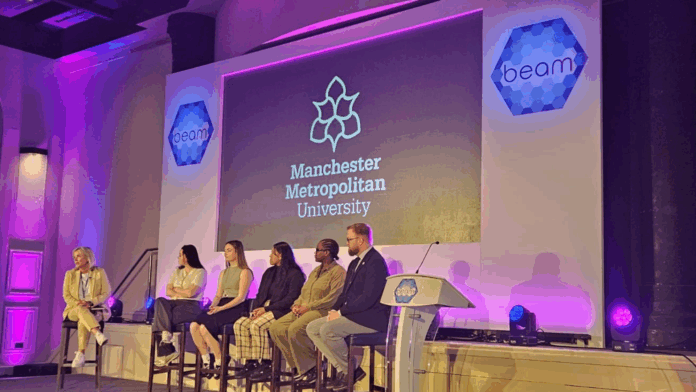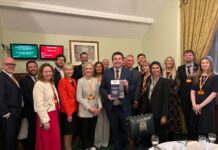One of the most powerful moments at beam’s 2025 All Members Meeting, held on 30 April 2025 at the Mercure Manchester Piccadilly Hotel, came from a panel of four confident, passionate final-year students from Manchester Metropolitan University, who shared their hopes, fears, and expectations for the future of employment in the events industry.
Moderated by beam board member Caroline Medcalf, the session featured Senior Lecturer Jonathan Sibley and students – Lucy Hucklebridge-Key, Rummanah Promi, Claire Pisira, and Rachel Wheeler – offering a bold and honest insight into what the next generation wants from the workplace.
Speaking to a room of more than 100 industry professionals, the students spoke with clarity and conviction about what matters most to them – opportunity, trust, meaningful mentorship, sustainability, and a diverse, inclusive workplace culture.
They made it clear – they’re more interested in the opportunities to learn, grow, and contribute, rather than the potential employer’s brand.
Rachel candidly described her biggest fear about entering the industry as being “thrown in at the deep end without support” – a situation she hopes to avoid by finding an environment where she’s trusted to take responsibility but still has someone to ask everyday questions. Lucy echoed the sentiment, saying her concern was slowing people down by needing training – when in fact, like many graduates, she’s ready to hit the ground running if given the right guidance and space to learn.
Another significant barrier raised was the lack of clarity around job titles and expectations across the industry. The students highlighted the confusion that exists when trying to understand what roles involve, particularly at entry level. Without standardisation or transparency in job descriptions, many find it difficult to map their career path – or even know where to begin.
Mentorship was a key theme throughout the conversation. While industry mentoring schemes such as Elevate and Fast Forward 15 were praised, it was clear that day-to-day, in-role mentoring – informal and ongoing – makes the biggest impact.
As Sibley noted, “The degree gives them the foundation, but it’s employers who must take accountability for their development once they enter the workplace.”
Representation matters, too. For Rummanah, who has authored a manifesto called Being a Muslim in the Events Industry, the lack of visible diversity remains a barrier. Claire, a REACH scholarship recipient, reinforced the need for role models and representation, noting how important it is for young people of colour to see themselves reflected in leadership roles across the sector.
All four students also voiced a strong desire to see genuine, committed action on sustainability. With placement experience behind them, they’ve seen first-hand the waste the industry can produce – and they’re paying attention to which businesses are taking responsibility and which are not.
Perhaps most striking of all, Lucy admitted she’d never even heard of the events industry until a family member introduced her to it – reminding the room just how much work is still needed to raise awareness and visibility among young people.
Speaking after the session, beam Chair Louisa Watson said:
“Everyone in the room was full of admiration for these students, they generated confidence, professionalism, and honesty. To speak so clearly about their fears and ambitions in front of a room full of senior professionals was inspiring – and humbling. There was so much to take away from that session. We were also delighted to hear how networking, both on LinkedIn and in person, is being actively encouraged by the university to help these future professionals connect and grow.
“In terms of raising our industry’s profile, we all have a role to play. I’d encourage every organisation and individual to reach out to local schools and colleges, and to join brilliant initiatives like The Power of Events Schools Programme to build awareness and open more doors to the future of our sector.”
The call is clear! The next generation is ready to contribute – not in five years, but now. But for them to thrive, the industry must ensure the doors are open, the support is real, and the culture is ready to evolve.











